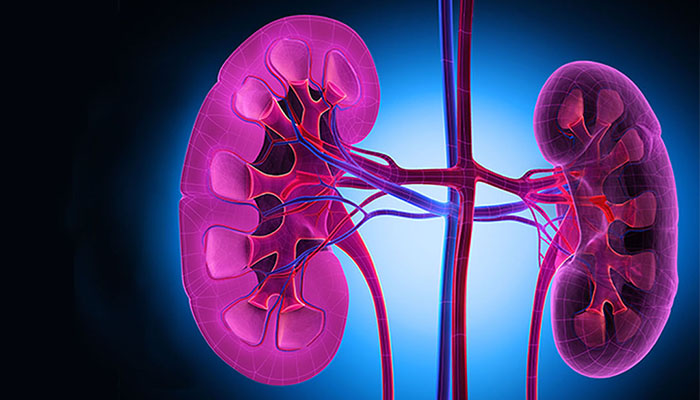HOW CAN WE HELP YOU? Call 1-800-TRY-CHOP
In This Section
Synergy in Science: Introducing the Penn-CHOP Kidney Innovation Center

The Penn-CHOP Kidney Innovation Center brings together an interdisciplinary community of kidney researchers.
limjr [at] chop.edu (By Jillian Rose Lim)
Healthy kidneys serve as an efficient filter to flush waste, retain nutrients, and help keep a child’s body growing. When this all-important organ fails, it can affect multiple areas of a child’s life, including growth, cognition, and bone and cardiovascular health, sometimes with effects reaching into adulthood. As such, research into kidney disease benefits when investigators collaborate across institutes and disciplines, sharing resources, data, and expertise.
At Children’s Hospital of Philadelphia, the Pediatric Center of Excellence in Nephrology (PCEN), led by Susan Furth, MD, PhD, and Michelle Denburg, MD, MSCE, has already made big strides in breaking barriers to better study pediatric kidney disease, recently receiving funding for an additional five years from the National Institute of Diabetes and Digestive and Kidney Diseases. Now, researchers in the PCEN and the University of Pennsylvania are taking their kidney disease research to a higher level, powered by the new Penn-CHOP Kidney Innovation Center (KIC). The brainchild of Dr. Denburg, Associate Professor of Pediatrics and Epidemiology, and Katalin Susztak, MD, PhD, Professor of Medicine and Genetics at Penn’s Perelman School of Medicine, the KIC aims to create a collaborative community between scientists at CHOP and Penn to promote a unique model for life course kidney science.
“The KIC is focused on life course kidney research and accelerating discovery of disease mechanism and therapeutic targets through multidisciplinary collaboration,” Dr. Denburg said. “The concept was to really get people across CHOP and Penn working on transformative research in the kidney that crosses basic science to patient-oriented studies. We want to build community, stimulate research through opportunities, and ultimately recruit the next generation of kidney researchers through enhanced collaborative training programs.”

Through interdisciplinary collaboration, the KIC will accelerate improvements in the health and well-being of all patients with kidney disease.
Creating Community
One of the KIC’s main goals, to create an engaged and collaborative research community, is already in motion. Alongside regular meetings and journal clubs, the KIC will be hosting a seminar series that features research in progress by CHOP and Penn postdocs, fellows, and faculty as well as experts from core facilities and invited outside speakers. KIC hosted its inaugural symposium on October 28th that featured oral abstracts and keynote speakers: Parker Wilson, MD, PhD; Mingyao Li, PhD; and Alex Hughes, PhD.
Through events like these, the Center will connect scientists in clinical epidemiology, biostatistics, bioinformatics, computational biology, genetics, pathology, physiology, biochemistry, immunology, genomics, pharmacology, psychology, and education. The idea is to encourage interdisciplinary collaboration as the driving force to accelerate improvements in the health and well-being of all patients with kidney disease.
The KIC also aims to create opportunities that will support the next generation of leading kidney researchers. These include opportunities for mentors and trainees across CHOP and Penn to connect, outreach programs targeted to undergraduate and medical students, and synergism with training grants focused on research methods.
Core Resources for Research
On top of nurturing a kidney research community, the KIC is also a way for its members to contribute to and utilize core research resources. One such example is the PCEN’s new Molecular Precision Nephrology (MPN) core. The core is one of the key ways that KIC and PCEN intersect, according to Sarah Green, administrative manager of research in the Division of Nephrology at CHOP. The MPN core is led by KIC’s co-leader, Dr. Susztak, whose work focuses on the molecular pathways that govern chronic kidney disease (CKD) development.
“The purpose of the MPN Core is to develop and maintain a tissue bank of human kidney samples, that can then be analyzed and translated into a kidney reference resource atlas,” Green said. “This is really a key initiative of both the PCEN and the Kidney Innovation Center.” The MPN Core will help scientists generate cell level definitions of healthy pediatric kidney tissue that can be used as a reference to identify important pathways or cell types for specific disease manifestations, as well as better understand how to develop targeted treatments. Green added the MPN Core will help to expand collaborations with Penn’s research base and promote life course research in nephrology.
Partners in Opportunity
Though pediatric and adult kidney disease have unique qualities and key differences, they can nonetheless inform each other and this is where the MPN, alongside other exchange of ideas between the KIC and the PCEN, may lead to valuable insights about kidney disease across the lifespan.
“I think there's a lot to be learned both on the adult and pediatric side from joining together to study kidney disease,” Dr. Denburg said. “By bringing pediatric and adult kidney researchers under one umbrella, we will accelerate the pace of discovery for both populations. Some processes of kidney disease are shared in adults and children, and others are unique, but in both cases, promoting crosstalk between researchers can shed light on mechanisms of disease for both children and adults and lead to precise diagnostics and treatments.”
This cross-talk between scientists studying pediatric and adult kidney disease is one of the most unique characteristics of the KIC, and one that Dr. Denburg believes makes it stand out as a force of change.
Learn more about the Penn-CHOP Kidney Innovation Center and the Pediatric Center of Excellence in Nephrology.